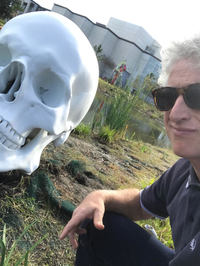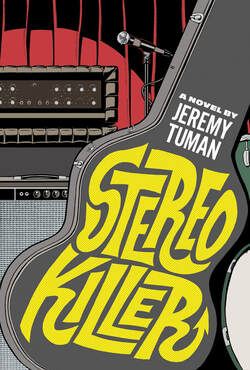
Jeremy Tuman lives in New Orleans, where he teaches English at Xavier University of Louisiana and plays in the rock 'n' roll band The Great Twenty-Eights. STEREO KILLER is his first novel.
https://www.goodreads.com/author/show/19646598.Jeremy_Tuman
https://www.amazon.com/Stereo-Killer-Jeremy-Tuman-ebook/dp/B07WW369M6/ref=tmm_kin_swatch_0?_encoding=UTF8&qid=1590794889&sr=8-1
Stereo Killer is the story of Chet, a former punk facing his middle ages with some reluctance. Can you tell us a bit about Chet and his process in the book?
Chet is a character who makes decisions based on immediate needs and immediate gratification, the way I think a lot of us do, but it's also a way that is socially discouraged as short-sighted, irresponsible, immature. This way of decision making is also seen as indicative of an aimless, wandering sort of life. While I think there's some truth in those perceptions, and we certainly can't make our way through by only addressing our immediate needs, I also think there's something very basically human in those instincts, and many times following them is exactly what's needed to maintain our sanity and give us some clarity in a messy and overstimulating society. Of course, punk rock is known as an immature genre of music that codifies resistance to social norms, including responsible decision making. So a decision to re-invest in punk rock as a middle-aged adult is an especially ripe decision for second guessing by responsible society. But even though punk rock has the visual and aural markers of prolonged immaturity, you don't need to look hard to see many other examples of this immediate gratification seeking that have been elevated to respectability, even desirability, such as consumerist fetishization, the "luxury" lifestyle, sports hero and celebrity worship. In a way punk rock stands against those other modes, and its fans see something noble in that stance.
Parker is a clear opposite number to Chet's calmer storm, tell us a little bit about him and why he was written this way. Do you like him?
Parker is a unique, singular, iconoclastic sort of person, very driven toward validation and acceptance by others, but insistent on retaining those unique and iconoclastic characteristics in the process. In other words, gaining respect in a scene by not selling out, which in a non-monetary sense just means by not compromising any core beliefs, in Parker's case, about good music, "real" punk rock and what it's made of. Looking around the music scene, for sure the underground music scene, and I'm guessing in mainstream music too, there are many Parker types in visible positions of success, in part because that type of uncompromising drive is what's needed to succeed. These people can be infuriating, unbearable, can be seen as total assholes, but there's usually another side as well, some key element of cool that attracts collaborators, fans, and maybe even some friends. Chet is a different type of creative person, more of a pure player in a musical sense, who seeks pleasure more from just the act of playing, and playing with others, the sound, the fun, the diversion created through playing music with others. But it's a longstanding trope with a ton of truth in it that people like Chet need people like Parker, and vice versa.
Where did the idea for Stereo Killer first spring from?
Years ago I told myself that at some point I would go back to school and try to get an advanced degree. I didn't know in what, but I knew that it was something I wanted and believed it was something I could achieve. After years of playing music and obsessing as a fanboy over certain branches of the rock music tree, including reading and loving writers like Lester Bangs, Richard Meltzer, Nick Tosches, and Peter Guralnick, I decided that I wanted to try writing about music. Guralnick's early, short portraits of people like Charlie Rich really influenced me. They were so well written and seemed so effortless. He's just go hang out with Charlie and catch his set in a nightclub, and that'd be the piece! I thought I'd try creative nonfiction and model on that, but it turned out I didn't have the personality to "interview" well-known people. I was much more comfortable writing about the scene I'd come up in, and the much lesser-known figures in it whom I'd interacted with over the years. Stereo Killer began as the essays I submitted to a creative nonfiction writing program and evolved over many years into the fictionalized novel.
Tell us a bit about your experiences in the punk and music scenes, do you see yourself as a bit like either Parker or Chet?
For sure I was like Chet, coming up in a college-town music scene that was so fun and felt so vibrant. Being in a small town in the south really freed us from identifying too closely with any one particular style or sub-genre. As this was taking place in the eighties, genre-blending and busting underground music was already spilling out of places like Athens. It was a wonderful noise! Part punk, part hippie psychedelic, later a huge dose of sixties garage, surf, rockabilly, and straight up southern-fried weirdness. The mid to late eighties were an exhilarating time, and the record store and the underground rags like The Bob and Forced Exposure played a huge part.
Do you have other books in the wings? If so, what will they be about?
Yes, I am working on a second novel, no title yet. It will be a follow-up in a certain thematic sense, but definitely not a sequel. The main character is somewhat an older version of Chet, but with an entirely different set of challenges to face and questions to answer, not having to do with creative endeavors (although that's in there) but with how to situate oneself and (re)forge an identity and confusing, rapidly changing, and potentially dangerous society. I know that sounds crazy vague! But of the key themes those questions get at, I'm not yet sure which one or ones will provide the thrust of the book. So far the vignettes are exploratory, reaching in different directions. On that process, part of why Stereo Killer took me so long to finish, even though much of the writing was done for years, was I needed to answer a few key structural questions, the ones that end up holding the whole thing together. Sometimes the hardest part isn't the writing, but to step back and see clearly what it is you have and what you want it to be, and what it wants to be.
How have you liked your experience as an author thus far? Any advice for other authors writing works like Stereo Killer?
Response to Stereo Killer has been overwhelmingly positive. It has truly blown me away. I've not moved a ton of copies, but the critical response has been amazing. Selling a few is fun, and selling more would be great, but when I get messages or see posts or reviews from readers, who I believe to be genuine, some of whom I respect tremendously (and who have no reason to blow smoke), I'm absolutely thrilled, humbled, and honored. To see readers enjoying your writing (your writing!) and seeming to appreciate the care you put into your sentences is an infinitely rewarding experience. As for advice, it's been said many times but it's still a trip when it happens to you, the aspects of your book you worry most about, no one else ever keys in on those as weaknesses. They'll find plenty of other weaknesses for sure! (I've had a few readers very put off by the cursing in the dialogue. That one threw me.) And they'll key in on strengths that you'd never considered. So the takeaway is to worry, worry is a good thing, but don't let it paralyze you because you're inevitably reading your reader wrong on some level. They won't see what you see.
Thanks for this opportunity to talk about the book It's been a blast!

***** 5 Stars
Punk Rock Chaos Meets Genuine Humor
Stereo Killer is absolutely a book for music fans, particularly those of us who were ever into Punk Rock. Here you’ll meet Chet, a former punk now in the role of teacher to some less than enthused teenagers who have no idea about his past. It could easily be said that in many ways Chet himself is a bit less than enthused about it, though he can look back at that part of his life pretty readily and count himself among the more informed people who could be teaching his students. A little lost between both the mundane and everyday world of regular life and the punk life of his past, he’s still trying to find where he fits in his current life when Parker, his old bandmate calls him up and eggs him on to join him and a couple of others on a spontaneous tour of Europe born out of new interest for the old band. With some reticence, and the awareness that he had left for a reason, but no idea why he’d decided to, Chet starts to get ready for the middle-aged version of a garage punk tour de force-except what will he do about the life he’d just started to invest in? Will the woman he just connected with still be there when it’s over? Will HE still be there when it’s over?
This book is an absolute blast and more than worth your listening time! Paul Burt does an excellent job of conveying the scene, it’s characters, and the shifting changes of mood and character throughout, even doing a nice job with the musical bits. The book itself is just as complex and engaging as the punk rock scene it portrays, I’ll definitely be keeping an eye out for more books from Jeremy Tuman. If you’re looking for a general idea of the mood before listening or reading, think of things like SLC Punk! and High Fidelity, where both dramatic mood and humor are in play, all blended together with music and chaos.
 RSS Feed
RSS Feed
